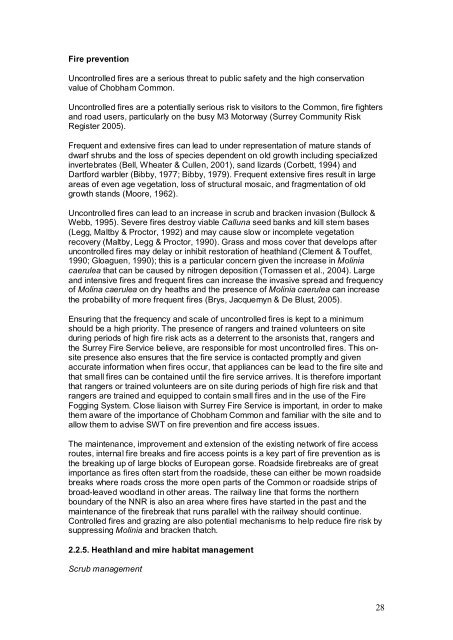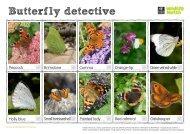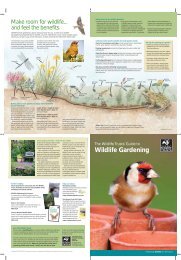CHOBHAM COMMON NNR - Surrey Wildlife Trust
CHOBHAM COMMON NNR - Surrey Wildlife Trust
CHOBHAM COMMON NNR - Surrey Wildlife Trust
You also want an ePaper? Increase the reach of your titles
YUMPU automatically turns print PDFs into web optimized ePapers that Google loves.
Fire prevention<br />
Uncontrolled fires are a serious threat to public safety and the high conservation<br />
value of Chobham Common.<br />
Uncontrolled fires are a potentially serious risk to visitors to the Common, fire fighters<br />
and road users, particularly on the busy M3 Motorway (<strong>Surrey</strong> Community Risk<br />
Register 2005).<br />
Frequent and extensive fires can lead to under representation of mature stands of<br />
dwarf shrubs and the loss of species dependent on old growth including specialized<br />
invertebrates (Bell, Wheater & Cullen, 2001), sand lizards (Corbett, 1994) and<br />
Dartford warbler (Bibby, 1977; Bibby, 1979). Frequent extensive fires result in large<br />
areas of even age vegetation, loss of structural mosaic, and fragmentation of old<br />
growth stands (Moore, 1962).<br />
Uncontrolled fires can lead to an increase in scrub and bracken invasion (Bullock &<br />
Webb, 1995). Severe fires destroy viable Calluna seed banks and kill stem bases<br />
(Legg, Maltby & Proctor, 1992) and may cause slow or incomplete vegetation<br />
recovery (Maltby, Legg & Proctor, 1990). Grass and moss cover that develops after<br />
uncontrolled fires may delay or inhibit restoration of heathland (Clement & Touffet,<br />
1990; Gloaguen, 1990); this is a particular concern given the increase in Molinia<br />
caerulea that can be caused by nitrogen deposition (Tomassen et al., 2004). Large<br />
and intensive fires and frequent fires can increase the invasive spread and frequency<br />
of Molina caerulea on dry heaths and the presence of Molinia caerulea can increase<br />
the probability of more frequent fires (Brys, Jacquemyn & De Blust, 2005).<br />
Ensuring that the frequency and scale of uncontrolled fires is kept to a minimum<br />
should be a high priority. The presence of rangers and trained volunteers on site<br />
during periods of high fire risk acts as a deterrent to the arsonists that, rangers and<br />
the <strong>Surrey</strong> Fire Service believe, are responsible for most uncontrolled fires. This onsite<br />
presence also ensures that the fire service is contacted promptly and given<br />
accurate information when fires occur, that appliances can be lead to the fire site and<br />
that small fires can be contained until the fire service arrives. It is therefore important<br />
that rangers or trained volunteers are on site during periods of high fire risk and that<br />
rangers are trained and equipped to contain small fires and in the use of the Fire<br />
Fogging System. Close liaison with <strong>Surrey</strong> Fire Service is important, in order to make<br />
them aware of the importance of Chobham Common and familiar with the site and to<br />
allow them to advise SWT on fire prevention and fire access issues.<br />
The maintenance, improvement and extension of the existing network of fire access<br />
routes, internal fire breaks and fire access points is a key part of fire prevention as is<br />
the breaking up of large blocks of European gorse. Roadside firebreaks are of great<br />
importance as fires often start from the roadside, these can either be mown roadside<br />
breaks where roads cross the more open parts of the Common or roadside strips of<br />
broad-leaved woodland in other areas. The railway line that forms the northern<br />
boundary of the <strong>NNR</strong> is also an area where fires have started in the past and the<br />
maintenance of the firebreak that runs parallel with the railway should continue.<br />
Controlled fires and grazing are also potential mechanisms to help reduce fire risk by<br />
suppressing Molinia and bracken thatch.<br />
2.2.5. Heathland and mire habitat management<br />
Scrub management<br />
28



![Thursley Common [Shrike Hill] (SU9041) & Sheets Heath (SU9457 ...](https://img.yumpu.com/11846073/1/184x260/thursley-common-shrike-hill-su9041-sheets-heath-su9457-.jpg?quality=85)

